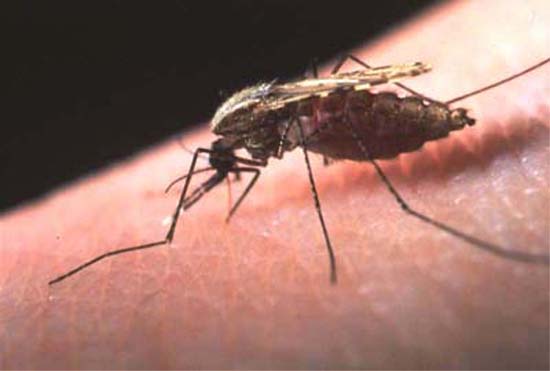
Harry spent three months in Ghana and eight days after his return he developed a headache and what he thought were flu-like symptoms. Less than a week later, the strapping 5ft 10in rugby player was dead, following a massive infection with falciparum malaria, the deadliest form of the parasitical disease. He was just 20 years old. To educate the public about the very real dangers of malaria, Harry's mother has now become an ambassador for a new Malaria Hotspots campaign. "The medical profession needs to be much blunter about the dangers of malaria," says Jo. "They need to say, 'This thing can kill you if you don't take your medication. At the moment, that's not happening nearly enough.'"
There are many myths about malaria, but perhaps the biggest of all is that westerners do not need to worry about a disease that claims 3,000 lives every day in sub-Saharan Africa and is responsible for an estimated three million deaths worldwide every year. A common argument is that because no anti-malarial medicine is 100% effective and many types have unpleasant side-effects, there is no point in taking a prophylactic if you are going to be in the tropics for prolonged periods. In fact, although there is growing evidence that parasites are becoming resistant to drugs in some parts of south-east Asia and Africa, prophylactics such as Lariam (mefloquine) and Malarone (atovaquone/proguanil) are between 90 and 100% effective when used with bite-avoidance measures, such as covering up at night when the mosquitoes are most active, and sleeping under a permethrin-treated mosquito net. And although it is true that in rare cases Lariam has been associated with depression and psychosis, the disease is still far worse than the cure. Ask Alex Beard, another ambassador for Malaria Hotspots.
Malaria Kills: 'If I went again, I'd take my pills'
If I went again, I'd take my pills'
The more we travel to Africa, India and south-east Asia, the less seriously, it seems, we take the risks of contracting malaria. Mark Honigsbaum on a new campaign to educate Britain about a disease that all too often proves fatal
Tuesday March 27, 2007
The Guardian
Jo Yirrell will never forget the moment her son Harry stepped off the plane from Ghana. "His feet were filthy, but otherwise he was the picture of health," she says. "The first thing he said was, 'Mum, as soon as I can raise the money I want to go back.'"
Harry had been teaching English in a small fishing village. "Many of the children at the school had malaria," says Jo. "Harry couldn't bear to see them suffer so he gave his pills away. He told me he didn't get malaria so he didn't think it mattered. It was the most stupid thing he ever did."
Article continues
Harry spent three months in Ghana and eight days after his return he developed a headache and what he thought were flu-like symptoms. Less than a week later, the strapping 5ft 10in rugby player was dead, following a massive infection with falciparum malaria, the deadliest form of the parasitical disease. He was just 20 years old.
In 2005, the latest year for which the Health Protection Agency has figures, there were 1,754 cases of imported malaria in the UK - 94 more than in 2004 - and 11 deaths, 10 of which were caused by falciparum. Nearly every case could have been avoided if the travellers had followed a course of malaria prophylaxis. Yet while travel to Africa, India and south-east Asia has soared in the past decade, surveys show that half of those jetting off to the tropics take no medical advice at all before leaving, while many, like Harry, fail for one reason or another to take their prescribed medication.
To educate the public about the very real dangers of malaria, Harry's mother has now become an ambassador for a new Malaria Hotspots campaign. "The medical profession needs to be much blunter about the dangers of malaria," says Jo. "They need to say, 'This thing can kill you if you don't take your medication. At the moment, that's not happening nearly enough.'"
There are many myths about malaria, but perhaps the biggest of all is that westerners do not need to worry about a disease that claims 3,000 lives every day in sub-Saharan Africa and is responsible for an estimated three million deaths worldwide every year. A common argument is that because no anti-malarial medicine is 100% effective and many types have unpleasant side-effects, there is no point in taking a prophylactic if you are going to be in the tropics for prolonged periods.
In fact, although there is growing evidence that parasites are becoming resistant to drugs in some parts of south-east Asia and Africa, prophylactics such as Lariam (mefloquine) and Malarone (atovaquone/proguanil) are between 90 and 100% effective when used with bite-avoidance measures, such as covering up at night when the mosquitoes are most active, and sleeping under a permethrin-treated mosquito net. And although it is true that in rare cases Lariam has been associated with depression and psychosis, the disease is still far worse than the cure. Ask Alex Beard, another ambassador for Malaria Hotspots.
Two years ago, Beard, now 22 and a freelance journalist, also travelled to Ghana and contracted malaria. Before leaving the UK she had taken medical advice and was given a course of prophylactics. She also bought a mosquito net. But within weeks of arriving at student digs at the University of Ghana, in Accra, she discarded the net because of the heat.
Four months later she set off with two friends across West Africa. En route to Burkina Faso she must have forgotten to take her medication for on arrival in the south of the country she fell ill. "It began with a pain in my stomach," she says. "The next thing I knew, I was having difficulty lifting a glass to my mouth."
Beard was rushed to the local vet - the only person in the area equipped to give blood tests - but even after she received the diagnosis she couldn't believe it. "He gave me a big bag of pills and told me to take 15 a day for three days. At the end of three days, he said, I would know whether or not the pills had worked."
Luckily for Beard, they did, but she will never forget the alternating chills and sweats accompanied by delirium as she battled against the parasite coursing through her body. At one point she was so cold that she put on a sweatshirt and wrapped herself up in the bedsheets only to wake up a few hours later in the shower fully clothed with the water running. "I must have been burning up and climbed into the shower to cool down. I have no recollection of how I got there."
Although Beard recovered sufficiently to continue her travels, for weeks afterwards she had trouble keeping her food down. Since her return to Britain she has also experienced recurrent cramps and dizzy spells as well as minor neurological problems.
"If I was to go again, I'd sleep every night under a net and religiously take my pills. It's so simple and yet your life depends on it."
In Harry's case, of course, it is too late for such advice, but Jo is determined that others should learn the lessons of his death. In hindsight, she says, she would have made sure he was better informed about the symptoms of malaria and what the dangers were so that he would not have been tempted to give away his pills. She would also like to see better training for doctors and nurses in the UK in recognising the symptoms of malaria.
When Jo called her local GP to say that Harry had just returned from Ghana and she was worried about his symptoms, she was told it was "unlikely he had malaria" and to monitor him overnight. When his condition deteriorated the following day and she took him to her local accident and emergency department, they said, "Come back tomorrow."
It was only when she insisted on a blood test that malaria was diagnosed, and Harry was rushed to the John Radcliffe Hospital in Oxford for specialist treatment. There, he was given intravenous quinine but although the drug killed the malaria parasites, by now his body had suffered a massive shock and his lungs had begun to fill with fluid. He was hooked up to a breathing machine and his condition steadily improved. Then, a few days later, he suffered a sudden relapse. The cause of death was given as "adult respiratory distress syndrome". However, Jo has no doubt that it was the malaria that killed Harry.
"They threw the kitchen sink at him, but his system was just shot to pieces. People need to understand that, with malaria, time is of the essence - a few hours can make all the difference."
Despite her experience, Jo says she will not stand in the way of her other three sons, all of whom want to travel to the tropics. "My advice to them is the same advice I give to everyone: don't be complacent, take your malaria medication, and enjoy your life".
The truth about malaria
Myth: I hardly ever get bitten and barely react to bites so I should be safe.
Fact: It takes only one bite to contract malaria.
Myth: I'm going in the dry season, so I will be fine
Fact: In wet seasons mosquito activity is increased. However, they breed wherever there is stagnant water and may still be active in the dry season.
Myth: Antimalarials are not 100% effective so there is no point taking them.
Fact: Antimalarials are between 90 and 100% effective, and in combination with good bite prevention can help to prevent you contracting malaria.
Myth: I am taking homeopathic medicines to protect against malaria so I should be safe.
Fact: There is no evidence that homeopathic or herbal medication will protect you. Neither is there evidence that yeast extracts such as Marmite or other products that contain vitamin B will repel mosquitoes.
· For more information on the dangers of malaria and where to go for medical advice, see malariahotspots.co.uk


















